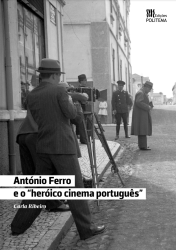António Ferro e o “heróico cinema português”
Keywords:
António Ferro, Portuguese cinema, Traveling cinema, Propaganda, Salazar, Tobis Portuguesa, Jornal Português, Leitão de Barros , António Lopes Ribeiro , Modernism, Censorship, Cultural Nationalism, Historical Cinema, Film Clubs, Film Legislation, Visual Culture, National Information Secretariat, National Propaganda Secretariat, Policy of the SpiritSynopsis
The book explores António Ferro’s pivotal role in shaping the cultural policy of Portugal’s Estado Novo regime, focusing on his leadership of the National Propaganda Secretariat (SPN) and later the National Information Secretariat (SNI). Ferro aimed to merge aesthetic modernism with Salazarist propaganda, promoting cinema as a tool for national exaltation, moral education, and identity construction. Through his “Policy of the Spirit,” he supported historical films, documentaries, and initiatives like Mobile Cinema and the Jornal Português, though he faced structural limitations, censorship, and internal opposition. His cultural vision, caught between artistic innovation and ideological indoctrination, proved contradictory, and after his departure in 1949, the Secretariat lost its aesthetic vitality, becoming a more conservative political body. Ferro’s legacy is complex: he was a disruptive figure who sought to modernize Portuguese culture within an authoritarian regime, leaving a profound yet controversial imprint on the nation’s cinematic history.
Chapters
-
Intodução
-
Modernismo, Política e Cinema: ligações perigosas?
-
O homem: António Ferro
-
A obra: o Secretariado e a “Política do Espírito”
-
Uma juventude ‘cinematográfica’
-
Leitão de Barros, António Ferro, a Tobis e o cinema português
-
A propaganda do Estado e da Nação pela via documental (I)
-
A propaganda do Estado e da Nação pela via documental (II)
-
As “Caravanas de Imagens”: o projecto do Cinema Ambulante
-
Testamentos ideológicos do regime – a produção ficcional e os filmes políticos
-
O cinema que Ferro desejava (I) – a literatura na base do cinema ficcional
-
O cinema que Ferro desejava (II) – a História na base do cinema ficcional
-
O cinema que Ferro desejava (III) – o folclore na base do cinema ficcional
-
A II Guerra Mundial e os projectos cinematográficos (I) – A União do Cinema Latino, as Produções Lopes Ribeiro e a Câmara Internacional do Filme
-
A II Guerra Mundial e os projectos cinematográficos (II) – O Brasil, a América e a Política Atlântica
-
A II Guerra Mundial e os projectos cinematográficos (III) – As co-produções com Espanha e o sonho da América Latina
-
Ferro, o Secretariado e o cinema a partir de 1944
-
O ideal de Ferro e a realidade de chumbo
-
Considerações finais

Downloads
Published
2022
Series
Copyright (c) 2022 Editions IPP
License

This work is licensed under a Creative Commons Attribution-NonCommercial 4.0 International License.

